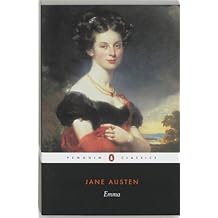I may just be a middle-aged Jane Austen fanboy – but Austen keeps earning my admiration novel after novel, and she’s done it again with Emma.
Since chances are good you already know the book, I’m going to skip the review and serve up random observations. I reveal much of the plot and all of the surprises in Emma, however. So, spoiler alert. Here goes:
Emma is a Comedy
The proper response to this observation is – I realize – “Duh”. But it’s also a remarkable fact because Austen’s other books are romantic dramas (except for Northanger Abbey, which is a parody of Gothic novels).
One of the qualities I admire in Austen is that she rarely writes the same book twice, even though her novels share so many themes and situations.
For example, Elizabeth Bennet and Fanny Price are about as different as two characters can be, and their novels are very different in tone, pacing, and plot. But Pride and Prejudice and Mansfield Park are both major achievements.
In Emma, Austen gives us a third variation which I think is easily the equal of these novels – and it’s a comedy. How many writers succeed in more than one style?
Emma is a Comedy … with a Conscience
Really, this is just ridiculously difficult to pull off and Austen makes it look easy.
The problem with comedy is that it is almost always based on pain. But you can’t laugh at a character and empathize with her at the same time.
To deal with this problem, writers usually locate their stories in a “comic” world that is largely free of consequences and death OR they reduce, deny, ignore or attack the humanity of their characters.
Austen does neither. Emma Woodhouse is a comic figure, and some of her foolish mistakes are funny, but it is Emma’s good intentions and the deep shame, regret, embarrassment, and pain she feels at her mistakes that make her more than a figure of fun.
And Emma is not alone, of course. Miss Bates is even more of a comic figure. In fact, there may be no greater clown anywhere in Austen’s work, and yet Miss Bates is treated with respect. When Emma insults Miss Bates during the excursion to Box Hill, Mr. Knightley rides to Miss Bates’ defense (“It was badly done indeed!”) and Emma weeps almost all the way home.
This is not comedy that produces belly laughs. It is delicate comedy, designed to make you smile, and possessing a grace and lightness that in its total effect is indistinguishable from wisdom.
Indeed, could we say the definition of wisdom is moral seriousness combined with laughter?
Emma’s only equal in this category I know is Shakespeare’s As You Like It. That’s pretty good company.
Everyone is Mistaken about Love
What a brilliant, delightful, simple conceit around which to construct a novel. Everyone is wrong about everyone else’s feelings, basically all the time. And yet it turns out happy.
Here’s a list of mistakes about love in Emma:
• Emma thinks Mr. Elton loves Harriet Smith
• Mr. Elton thinks Emma loves him
• Emma thinks Mr. Dixon loves Jane Fairfax
• Mrs. Weston thinks Mr. Knightley loves Jane Fairfax
• Emma thinks Frank Churchill loves her
• Mr. Weston, Mrs. Weston, and Mr. Knightley think Emma loves Frank Churchill
• Emma thinks Mr. Knightley loves Harriet Smith
This list doesn’t include Emma’s serial mistakes with Harriet Smith, which are persuading Harriet to fall out of love with Robert Martin; persuading Harriet to fall in love with Mr. Elton; and persuading Harriet to fall in love with Mr. Knightley while thinking she was persuading Harriet to fall in love with Frank Churchill.
It also doesn’t include the biggest mistake of all: no one realizes that Frank Churchill and Jane Fairfax are in love.
Emma is the Snob on Top
As I said, I admire Austen for rarely writing the same book twice. Emma is unique in Austen’s work as a comedy. It’s also unique because its major characters sit on top of the novel’s social order.
In Sense and Sensibility, Pride and Prejudice, Mansfield Park, and Persuasion, the main characters are all marginalized or dispossessed in their societies or families, and generally opposed by those who rank higher or think more highly of themselves.
In the novel, Emma Woodhouse and Mr. Knightley are the rulers of their set. Emma is aware of her social position, guards it carefully, and is jealous when it is infringed. (For example, part of the offense Emma takes at Mr. Elton’s marriage proposal is his presumption that he was Emma’s social equal … an heiress of 30,000 pounds!)
Mr. Knightley is less particular than Emma about the niceties of his status, but he wields his power with the same sense of entitlement. Mr. Knightley has perfect confidence in his judgment of every situation, and rarely yields to the opinions of other people. He does not give offense wantonly, but he doesn’t worry about offending Mrs. Elton when she presumes to guide his choices or the Westons when he speaks poorly of Frank Churchill.
This is significant because Emma and Knightley would be the villains in other Austen novels. By all rights, Harriet Smith and Robert Martin should resent Emma’s interference in their lives, the way Elizabeth Bennet resents Lady Catherine’s in hers.
But Harriet is very sweet, and not all that bright, and she seems to feel Emma’s hugely mistaken good intentions more than she notices Emma’s mistakes. As for Robert Martin, we don’t know. In the end, he got the woman he loved, and as practical man of good sense, apparently content with his station, perhaps he decided the rest didn’t matter.
From drama to comedy, and from villain to hero, these are two reasons to admire Emma. And now I think I’m done with Jane Austen for a time. On to the next author!

No comments:
Post a Comment